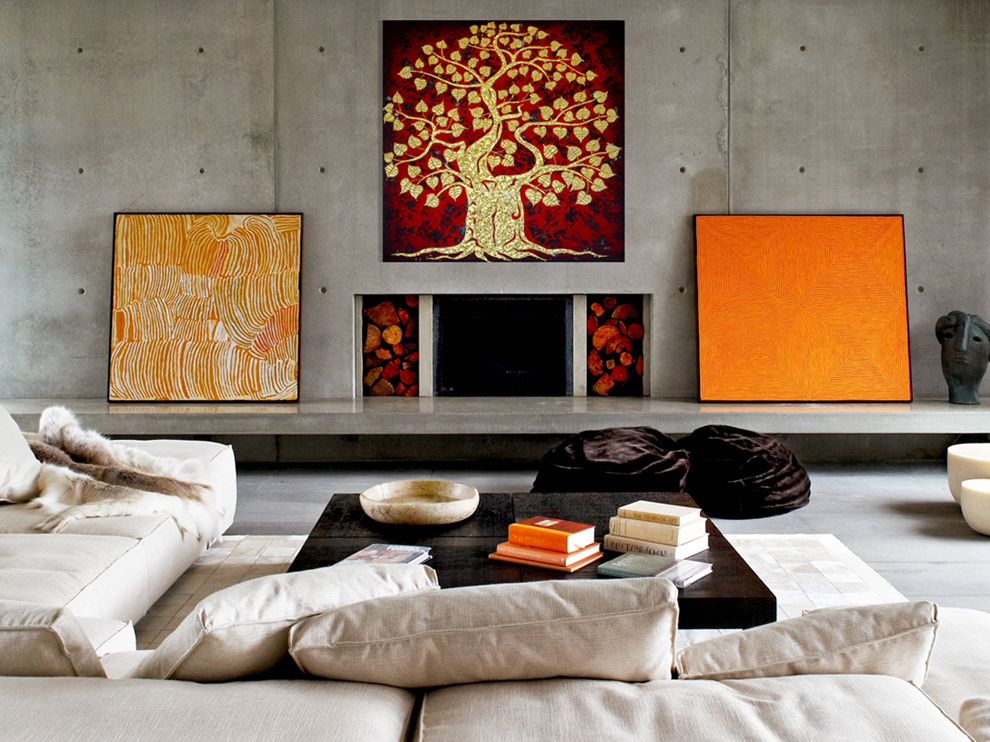[Pronounced. Fuhng-shwey]
Feng shui is not a set of strict rules that need to be followed to the letter, it can be incorporated into any existing decorative style to complement your personal aesthetic taste.
If you haven’t read our other blog post ‘Feng-shui 101’, to learn the basics of the practise, then do so now!
As we know, one of the main aims of feng shui is to encourage a healthy flow of energy, therefore if you don’t like the way something looks, you will find it impossible to create a positive energy towards it. Unfortunately, feng shui is not as simple as buying a load of Yin-Yang symbols and randomly placing them around your home. It’s about understanding how things in our environment relate to one another and ourselves, and arranging them in our space to create balance, and a positive flow of qi. There are a lot of differing practises in feng sui, and not every lesson from the vast schools of knowledge will work for you, so here is a room-by-room guide of some (relatively) easy ideas to implement feng shui, your way.
Entrance
The Entrance to your home is one of the most important areas to consider in feng shui – it is the first thing people see when they walk in, and the front door is the gateway for all external energies entering your home. Therefore, you want it to be as light, bright, and welcoming as possible - If you don’t have any natural light in your hallway, utilise a table or floor lamp. Additionally, add a mirror to create extra light, but avoid placing it directly opposite the front door as this could direct your home’s energy outwards. Make sure your hallway is clean and free from clutter (especially shoes), so your doorway can open at least 90 degrees, to allow the positive qi to flow into your home free from obstruction. Include a small number of items that inspire happiness such as a houseplant, or a bunch of flowers, and be sure that your front doorbell is functioning properly as you want people to feel welcomed, and broken items represent negative qi.
If you really want to feng shui your entrance, focus on your front door. A strong front door can welcome positive energy and opportunities into your home, so start by finding which way your door faces (use a compass and stand in your front doorway facing out, this is your front door direction). Then use the bagua map and the five elements to guide you, so you can create optimal qi for your entrance:
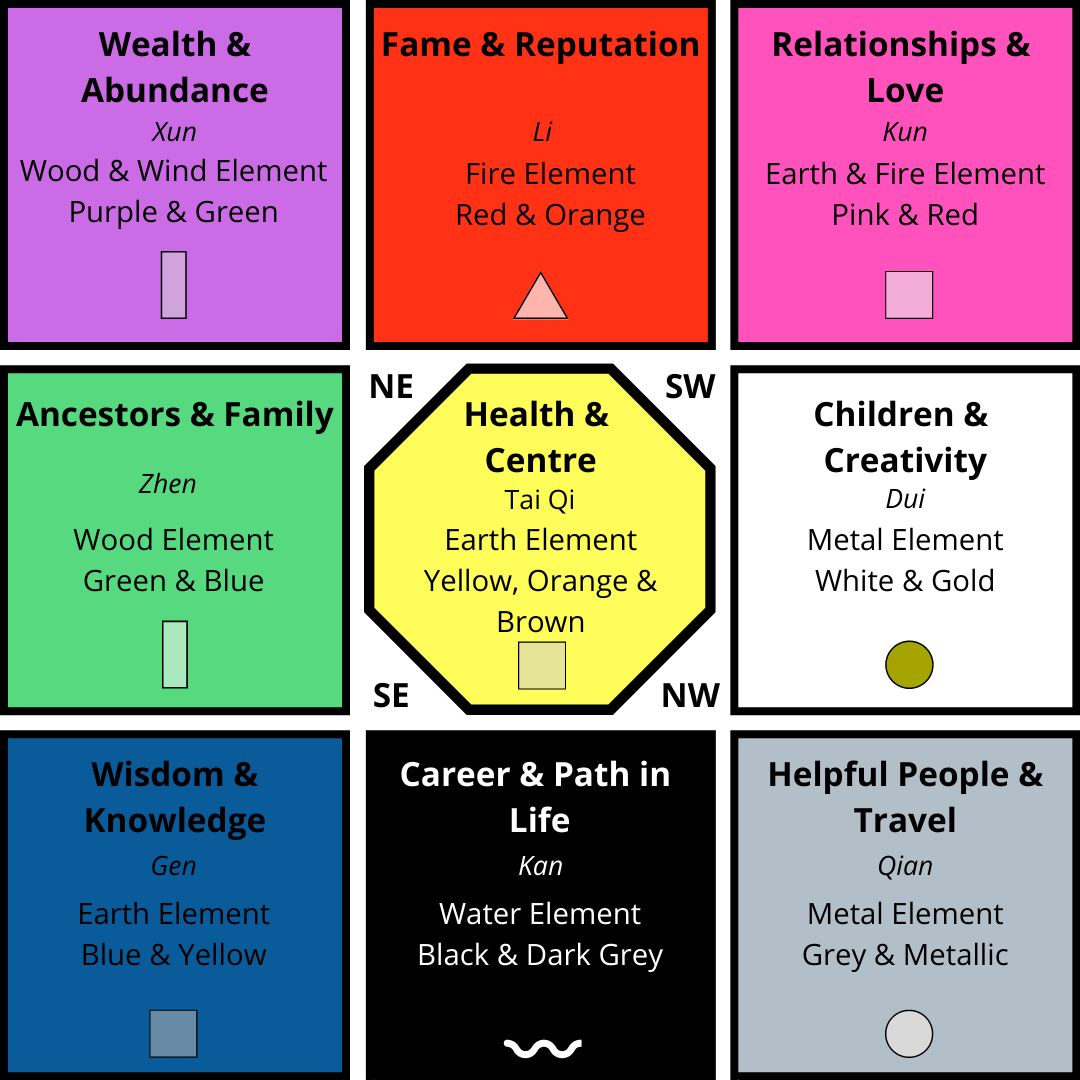

North Facing
- The North direction is related to the water element which represents prosperity, movement, and purity, and is connected to the Kan area of the bagua map which is indicative of ‘career and path in life’.
- Support this by painting your door in a water element colour such as black, dark blue or grey. Or use a metal element colour (as remember metal feeds water in the five-element cycle), such as white, off-whites, or metallics.
- If you can’t change the colour of your door incorporate the elements another way – perhaps a black welcome mat, white plants, or a metallic house number
East Facing
- The East direction is linked to the Zhen area of the bagua which represents Ancestors & family. This area can be enhanced using the wood element which is symbolic of growth, flexibility, creativity, and health, or use the water element as water nourishes wood in the five-element cycle.
- Paint your door in wood element shades – greens, blues and teals, or water elements colours – black, dark blues or greys.
- If you can’t change the colour of your door incorporate the wood element another way by adding plenty of green plants, a welcome mat with a vertical stripe design, or a wooden door knocker.
South Facing
- The south direction is associated to the fire element as well as the Li position of the bagua, which is connected to fame and reputation.
- Paint your door a colour that supports the fire element such as reds, pinks, and oranges, which characterise passion, fame, inspiration, and expression. Alternatively chose colours of the wood element (as wood feeds fire on the five-element cycle) such as shades of green and blue.
- If you can’t change the colour of your door incorporate the fire element by using red flowers in hanging baskets or wooden planters, or possibly hang a fiery coloured wreath on your front door.
West Facing
- The West direction is connected to the metal element which is emblematic of logic, clarity, and productivity, and is also closely related to speech. It is also tied to the Dui position on the bagua which signifies children and creativity.
- A west-facing front door can be enhanced using the colours of the metal elements - white, grey and metallics. Or using the five-element cycle, earth feeds metal, so use browns, yellows, and earthy tones.
- If you can’t change the colour of your door incorporate the metal and earth elements using metal objects, perhaps a letter box or flap, or a terracotta pot. The metal element is also synonymous with round and spherical objects.
Living Room
The living room is often quite a public space so should feel energising and inviting; however, it also needs to have that element of cosiness so you can feel relaxed. To achieve this, start by using the commanding position theory.
The commanding position within a room is the optimal position to be situated to enjoy the best flow of energy, and consequently, it should become where you will want to spend most of your time. Therefore, it is this position where you will want to place your ‘dominant’ pieces of furniture such as your bed, desk, sofa and oven, as each of these items represent a significant aspect of your life. To find the commanding position, find the point that is furthest from, but diagonally in line with the door, so you still have a good line of sight to the entryway. The idea behind this is that you have a good view of anyone or anything that could be entering the space, so subconsciously you feel at ease, and means you are more aware of potential opportunities that may be coming your way.
Find the commanding position, and that is where you should place the sofa; then you can work outwards from there. There should be enough seating for all members of the household, along with extra for guests (if possible!), and the seating should be positioned in an open square or circle around the sofa, so that everyone can see each other. This positioning encourages communication and should allow positive energy to flow in a slow meandering circle surrounding you. Avoid using too many straight lines, or ‘poison arrows’ in this area as this fosters qi that travels rapidly, and therefore may pass by you altogether.
Make use of the bagua by laying it over the floorplan of your home and see which section your living room falls into. Then use this information to help you make decisions such as the dominant colour of the room, or what shape of coffee table you should have. For example, if your room falls into the Zhen (ancestors and family) area, you will want to use green and blue shades, and have rectangular shaped furniture. Although, the aim of feng shui is always to find a balance, so you don’t have to stick to the colours/shapes of the corresponding section religiously. Decorate with plants to invite growth, and use soft, thin curtains to allow light to flood in through the windows, without letting the positive energy escape. Lastly, place a rug in the centre of the room (again use the bagua to guide you on the optimal colour or shape for the rug) to connect and ground all the occupants.
Kitchen
The kitchen is one of the most important feng shui rooms in the home as it represents your health, with the oven being at the heart of this. The kitchen is where you cook and get nourishment and therefore how well you eat directly relates to how well you feel and the qi that you emit. Ideally your kitchen will be located at the back of your home either in the north or south end, but if this isn’t the case, do not fear! You can still ensure plenty of positive qi flows through this space without doing major structural renovations.
As with the sofa in the living room, the oven wants to be in the commanding position of the kitchen – meaning it is placed with a sightline of, but not directly opposite the door. If possible, avoid placing the sink next to the oven as this creates a clash between the water and fire elements both these appliances represent. Keep the oven in good repair, and you want to aim to use it at least once a day, even if it’s just too warm your take-away up, as this keeps the energy active.
Try to keep everything clean, countertops clear, and regularly check your fridge and cupboards for any out-of-date food, as this will attract negative, decaying energy. If your cabinets don’t reach all the way to the ceiling, fill this space with plants or décor to prevent the accumulation of negative qi in this blank space. And finally use the bagua to find the congruent colour for your kitchen, and then apply it where you can - whether this is on your walls, cabinets, or on something smaller, such as your plates.
Dining Room
The dining room is a place where we are meant to gather with family and friends to eat, have conversation and to connect - and to that end it represents friendship. Like many of us, your dining room is probably also used for a heap of other purposes, so be sure to clear it off for when you are using it to eat.
The dining table should be an appropriate size for the room and preferably circular or ovular in shape. If your table is square or rectangular, then either try to get the edges softened so the sharp corners don’t block the flow of qi, or place spherical objects around it, like a circular rug, or placemats. The table is best placed in the centre of the room then at a slight angle in relation to the walls. This allows the qi to flow in a gentle curving path around the room, whereas if the table is parallel with the walls, the energy will be channelled in a straight line through the room, creating a harried feeling, with the danger of qi getting trapped in the corners.
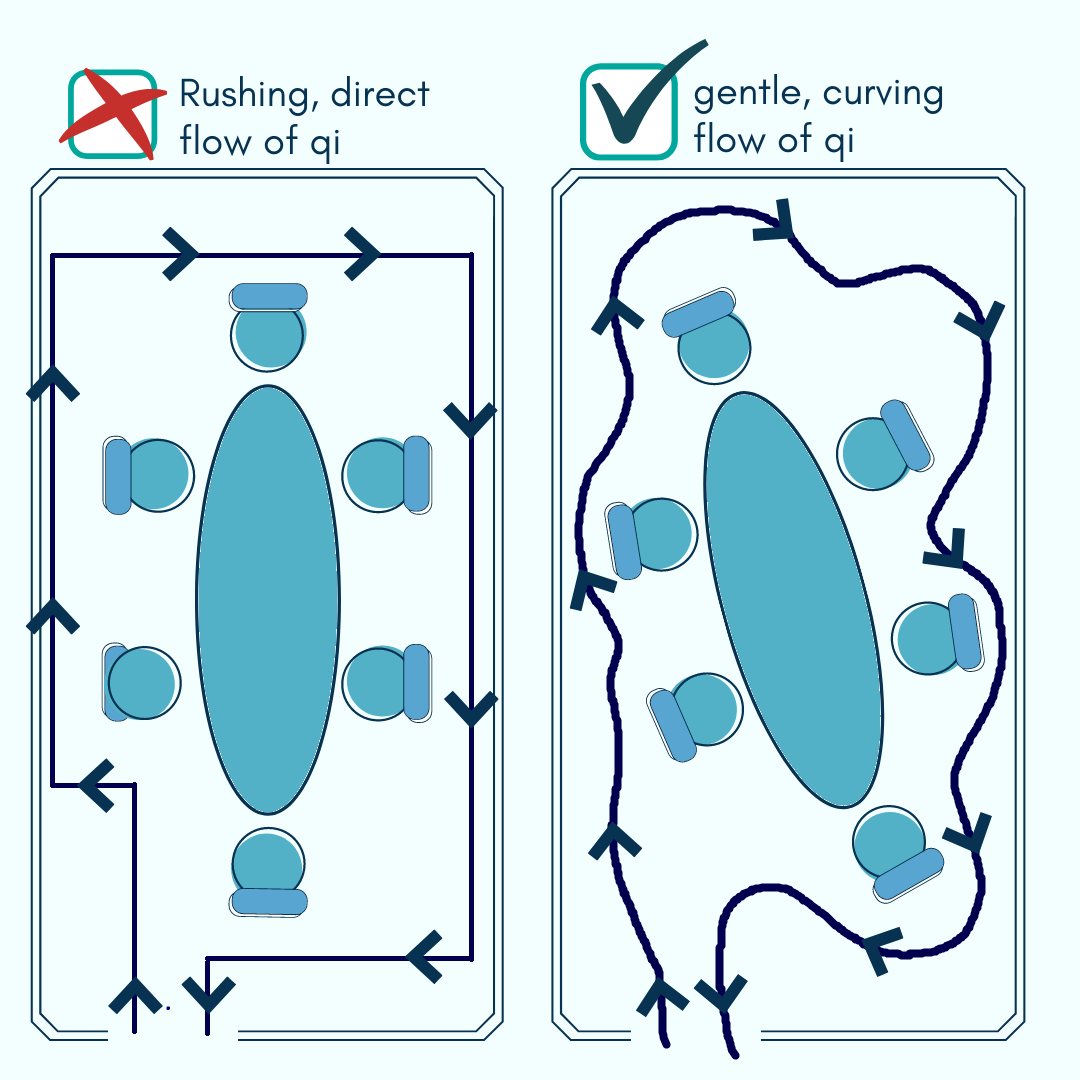
There should be enough seats at the dining table for everyone to have a place, but it is best practise to keep chairs in even numbers, with either 6 or 8 chairs around the table being ideal. This is because in Eastern cultures, the number 6 is believed to cultivate good luck, wealth, and prosperity, together with the number 8 also being synonymous with good luck. Now we have enough seats for everyone, where should everyone sit? The host should never have their back to the door, and the eldest member of the family should get the ‘honoured’ spot sitting furthest away from the door, with a solid wall backing. Ideally, no guest should have their back to a window or door as this is seen as a ‘weak’ position, leaving that person feeling insecure.
The colours of your dining room should stimulate feelings of relaxation and calmness so decorate with mainly neutral shades, and look to avoid large patterns in the room that could undermine the serene energy. You can introduce some colour into the room through a table centrepiece. Flowers or fruit, in a rounded vase or bowl, are the ultimate option as these will invite positive qi. Different fruits are said to have distinct significance; apples help develop friendships, pears aid positive energy, peaches boost health, and oranges attract richness - so fill your room with oranges and watch the riches pour in!
Bedroom
Your bedroom should be a sanctuary of relaxation and tranquillity and therefore the qi in here should be more yin than yang. To achieve this, keep the colour palette neutral and use the earth element to inspire your décor. When decorating, try to keep things symmetrical and in pairs, for example two bedside tables, lamps or pillows etc., as this will stimulate the love and relationships life area of the bagua, leading to hopefully successful results!
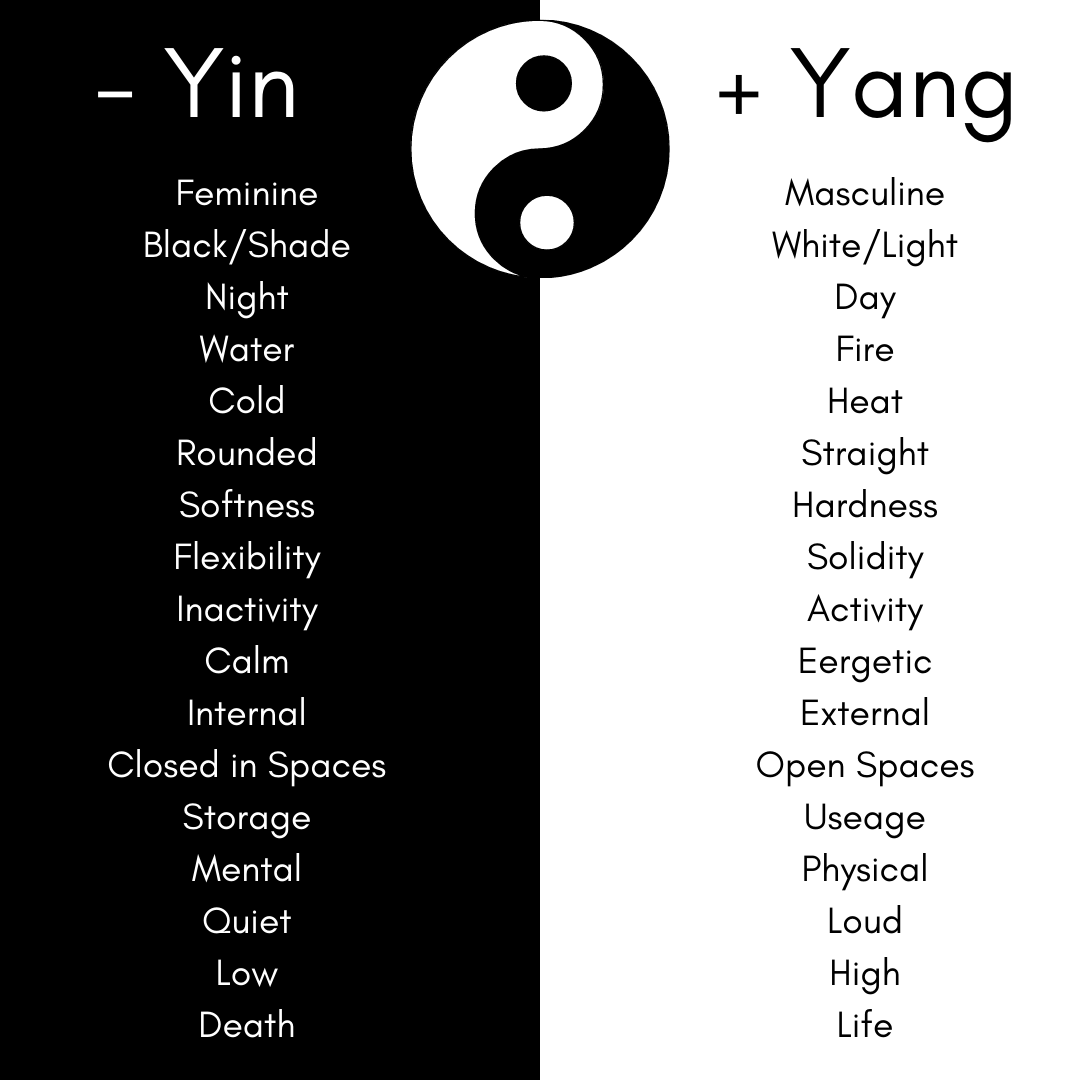
In feng shui your bed is said to represent you and therefore place it in the commanding position of the room (diagonally across from the door). A headboard in feng shui creates a feeling of support and protection, so strengthen the commanding position by having a solid headboard behind the bed that is securely attached. Preferably the headboard should be an upholstered design with soft edges. You want to amplify your soft furnishings in this room to invite the positive qi in, so surround yourself with duvets, quilts, blankets, and pillows. Choose natural materials for your soft furnishings and sheets such as linens or cottons and keep them in neutral or earthy shades to enhance the earth element. Try to avoid placing any heavy objects such as chandelier light fittings, beams, or ceiling fans directly above your bed, and remove any storage or clutter from underneath your bed - this is to create an open channel for the qi to circulate and surround you whilst you’re sleeping. Remove any electronical devices from this room, and don’t use your bedroom for any other activities than those that are relaxing and/or joyful.
Bathroom
It may be obvious to say but the bathroom naturally has a substantial amount of the water element. In feng shui an abundance of the water element can cause feelings of being overcome by unbalanced emotions. Negate this by using the earth element, as earth clogs water, by using earthy tones to decorate, and adding decorative items such as, terracotta pots, low wide objects, and crystals.
Get the bagua out again and find which life area your bathroom symbolises. Because of the number of drains that can be found in a bathroom, that life area is literally being drained away. You can counteract this by increasing the element, shapes and colours that represent that life area, and by keeping the bathroom door closed. To go one step further, energetically delete the bathroom altogether by installing a mirror on the outside of your bathroom door, removing any of those pesky feng shui issues your bathroom causes.
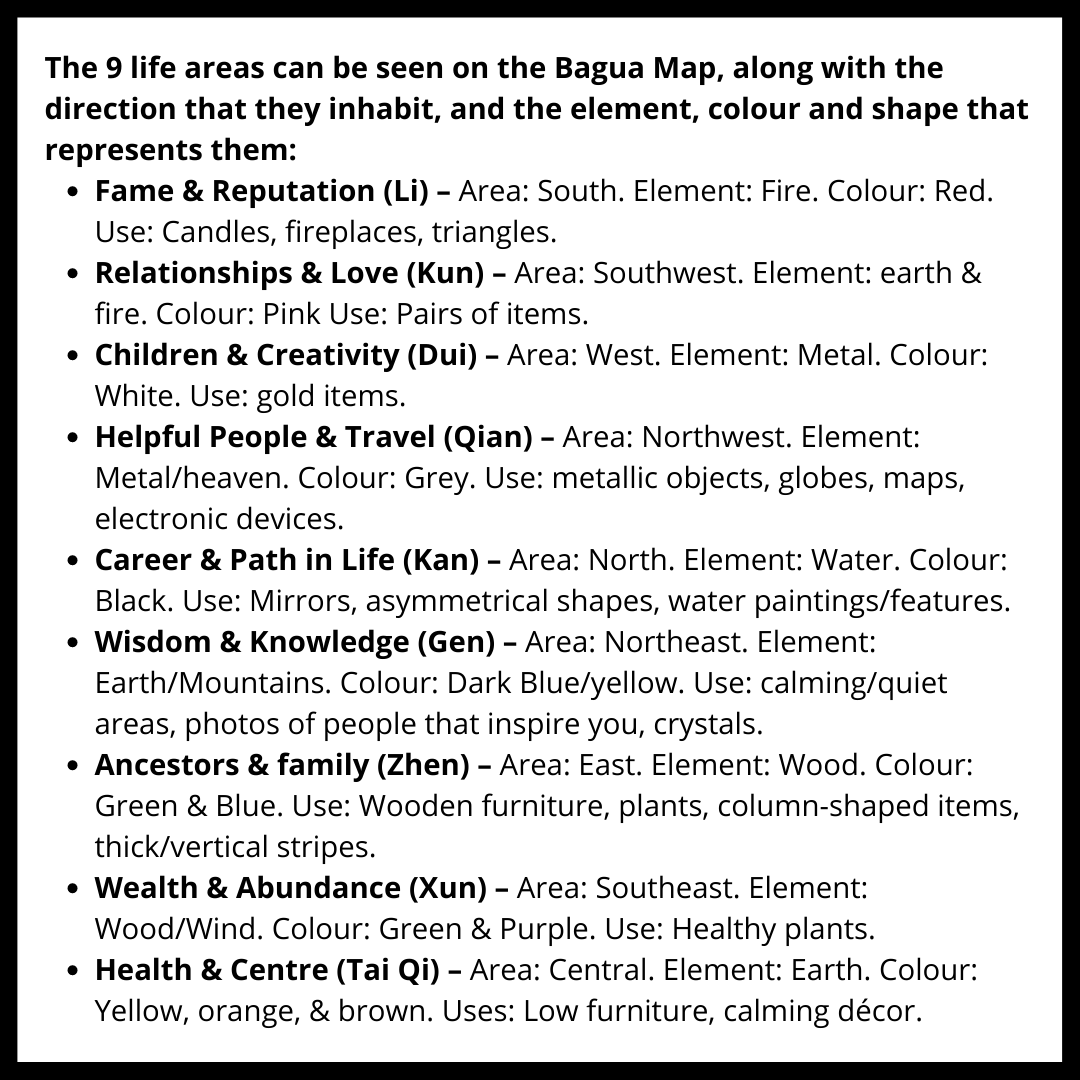
Since the bathroom signifies a place to purify your body in feng shui, aim to keep it gleaming clean, and refreshen your towels frequently. If you’re anything like me you’ll have hundreds of bottles of products that you don’t use, don’t need and are probably years past their expiration date. This is a bad omen in feng shui as these products will be holding onto stagnant, undesirable qi, so regularly clear out your cupboards and get rid of any products you no longer use. Moving onto the toilet, always keep the seat shut whilst it’s not in use to stop the positive energy being flushed away. Sit a houseplant on top of the toilet as it will transform the downward draining energy, into uplifting, enriching energy.
Home Office
Working from home has become the norm for many of us since the pandemic started, but not all of us thrive from having our work and home lives so closely intertwined. Feng shui suggests that your home office, and especially your desk, symbolise your career. So, making a few design tweaks to implement the feng shui philosophy can hugely enhance this area of your life. As we spend so much of our time working at our desk its worthwhile making this area comfortable, organised and aesthetically pleasing.
Let’s start with your desk. You should have a desk situated in a room that is solely dedicated to your work. However, if this is not possible, choose a multifunctional room and use a bookshelf or divider to separate this space from your work area. As stated earlier, your desk is a representation of your career, and as a result you will want to choose one that is solid and stable. Avoid desks that have glass tops, as your ideas and projects may well end up energetically falling through it and getting lost to all of existence. Your desk should be placed in the commanding position of the room and if this isn’t possible, tactically place a mirror, so you can see the door and can welcome all those opportunities that are flying towards you. A spot with plenty of natural light will help counteract the harsh lights from electronic devices and being able to experience the days natural light-cycle, will help you relax, and get out of work-mode at the end of a hard day.
If you’re noticing areas of your career that you aren’t excelling in, you can use the bagua to assist you in evaluating what may be happening. Visualise the bagua placed over both your office space and desk and have a look to see where lots of clutter is accumulating. Clutter releases stagnant, negative qi, and therefore this will travel into that area of your career. For example, if there are lots of papers, pens and forgotten about to-do-lists located in the top right corner of your desk, in the Kun (Love and relationships) area of the bagua, this could be a reason why you are struggling with a professional partnership. So, try to keep your desk clear, and strategically place items in specific life areas to enhance your home office. The two life areas of the bagua that can have a substantial effect over your career are the Li (fame and reputation) and the Xun (wealth and abundance) areas. Activating the Xun area will encourage more wealth and prosperity to flood towards you. This can be stimulated through the use of amethyst or citrine crystals, and by utilising the practise of intention setting.
In feng shui the key ingredient in whether positive qi will result in success or not is starting with the intention that it will be effective. It is believed if there is doubt in your mind, the efficacy will cease to exist. A positive frame of mind, with a healthy respect for oneself and others is the magic mantra that invites wellbeing into our homes.
Fame and reputation effects how highly you are recognised for your work, or how visible your business is. If you are feeling overlooked or like you deserve more recognition, activate this area by adding a houseplant, or something in a shade of red.
Garden
Feng shui isn’t only limited to the inside of your home, you can also apply it to your external spaces. Your aim, as it is indoors, is to create a smooth flow of qi that slowly meanders around your garden. You can achieve this through well-positioned pathways, flowerbeds and plants, that guide the qi around the space. Look to use undulating edges and rounded shapes, rather than straight lines and sharp angles, to create your garden oasis.
Create a focal point that captures the essence and intention of the feeling you want your garden to emit. Consider the type of energy you want to emanate when deciding on your focal point. For example, a firepit will bring in the fire element symbolising warmth and kindness, creating a different type of energy to that of a pond, which would cultivate a cooling and quiet energy like that of the water element. Other focal points you could introduce would be a large flowering plant symbolising earth element, a metal sculpture indicative of the metal element, or a wooden bench embodying the wood element, each producing a different type of energy.
Let’s end on a cheesy, but important note - to really implement feng shui, your way, fill your home with things you love. Make sure it is a place you can feel relaxed and happy as this will allow the positive qi to emanate, leaving you with only good energy in your home!


